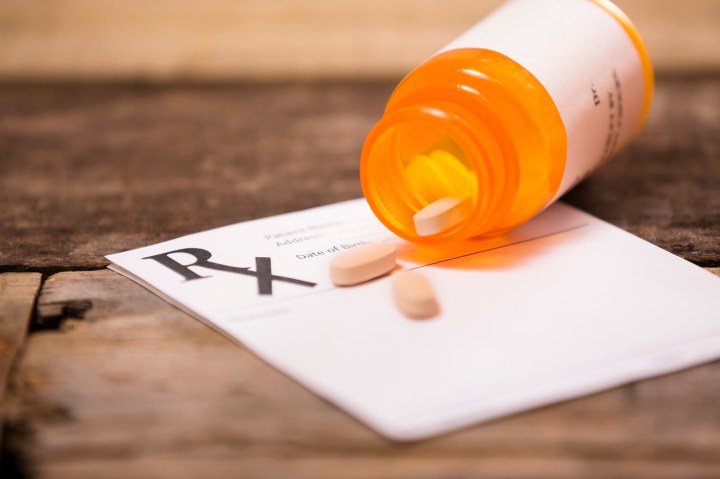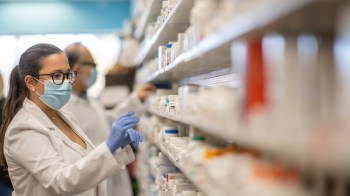
Mark Cuban’s Cost Plus Drug Company offers discounted drugs, but can it change the pharmaceutical industry?
Share Now on:
Mark Cuban’s Cost Plus Drug Company offers discounted drugs, but can it change the pharmaceutical industry?

Mark Cuban, the tech entrepreneur who’s a regular on ABC’s “Shark Tank,” has a new pitch for American consumers: an online pharmacy that sells discounted generic medications.
For now, the company will function as a compounding pharmacy, which allows it to be less regulated than a generic drug company, although it will have to register with the Food and Drug Administration and be subject to certain manufacturing requirements, reported Endpoints News, an independent news organization that covers the biotech and pharmaceutical industries.
The recently launched Mark Cuban Cost Plus Drug Company charges customers the same price it costs to manufacture these drugs, plus a 15% markup and a pharmacist fee. It delivers medications to every U.S. state except North Carolina, although its FAQ notes that it anticipates being able to ship there soon.
Drug prices in the U.S. are exorbitant and out of reach for many Americans, experts say. But political efforts aimed at solving the issue have been stalled in Congress.
Democrats unveiled a plan last year that would lower prescription drug prices, capping out-of-pocket spending for seniors at $2,000, and enable Medicare to directly negotiate prices with drugmakers. But this new policy is a part of the Biden administration’s Build Back Better plan, which Democrats were hoping would get a key swing vote from West Virginia Democratic Sen. Joe Manchin. However, despite attempted negotiations, Manchin said the bill is “dead.”
Where the government has failed, the private market is stepping in. Cuban is pushing his company as one part of the solution. Experts are cautiously optimistic, but mixed on whether the company will make an overall difference in drug pricing for consumers.
The new service, which pledges to be “radically transparent,” says that, for example, a 30-count supply of 400mg cancer drug Imatinib costs $47.40 at its store, compared to a retail price of more than $9,657 at other pharmacies.
In total, Cost Plus Drug offers more than 100 generic drugs. According to its site, the company currently does not accept health insurance.
A 2021 poll from Gallup and West Health found that 18 million Americans, or about 7% of U.S. adults, can’t pay for at least one medication prescribed by their doctor. About 1 in 10 Americans said they skipped dosages in the past year to save their medicine, a rate that’s nearly double among Americans who make less than $48,000 a year.
Americans also pay more for prescription drugs than people in any other developed country. On average, they spend more than $1,300 a year on prescription drugs, according to data from the Organisation for Economic Co-operation and Development.
After you set up an account on the site, Cost Plus provides you with a prescription request form, which your doctor has to fill out. Your physician then has to send it to Cost Plus by either calling or faxing the company, or sending it electronically.
Will this have any impact on drug pricing?
Cindy Parks Thomas, a health policy professor at Brandeis University, said that the entire pharmaceutical industry is guarded and that we don’t know how much we’re truly paying for any given drug.
“I think generally, everybody would agree that having new entrants into the market and trying to disrupt these problematic prices is a good thing,” she said.
However, experts say the company is not a solution for high drug prices, because it doesn’t cover all medications, like biologics or non-generic drugs.
Thomas pointed out for example that insulin — a common but hard-to-make drug that can cost about $6,000 a year — isn’t offered through the site.
Stacie Dusetzina, an associate professor of health policy at Vanderbilt University, noted that the service does not include brand-name drugs, which cost about 80% to 85% more than generic drugs according to the health care company GoodRx.
“You really have to use health insurance to make those affordable for people paying cash,” she said.
Dusetzina said companies are allowed to price brand-name drugs “as high as the market will bear.”
“It has been shown over time, for some drugs, that the list prices are going up very substantially — even if the price that your health plan pays for that drug isn’t,” she said.
The company also does not accept health insurance, which is a key reason why Dusetzina said it’s able to offer these drugs at a low price.
“They are avoiding the administrative challenge of working with health insurance and setting up reimbursement in those systems,” Dusetzina said. “So, in a way, this is just bypassing the paperwork aspect.”
She explained that for those with health insurance, purchasing these drugs may not count toward their deductible.
“Going outside of their health insurance may result in them not getting close enough to meet the deductible for the year,” Dusetzina said. “So you have to do a little bit of mental math about whether or not it’s a good deal for you, or the best deal for you to pay cash outside of your health insurance versus using your health insurance benefits.”
What benefits does the company offer?
While there are some limitations to the service, experts are welcoming news of the company’s debut, and think it’ll help people who have trouble affording drugs in an opaque market where patients also have to pay for other services.
Dusetzina said that this store may help those who don’t have access to affordable health insurance and have to pay cash for their medications, or struggle to pay even if they do have insurance.
“We know a lot of people have to pay deductibles when they’re filling prescriptions, or they may have a high co-pay for filling some generic drugs. So for those individuals, they may find that they can get a better deal by going through a program like Cost Plus Drug,” Dusetzina said.
Jerry L., a 36-year-old tech worker from the Bay Area, said he pays for two prescriptions that cost him about $300 to $350 a month, after insurance and discount prescription cards.
One of them is available on Cost Plus Drug for $33. The price he normally has to pay for that drug? About $130.
He’s already reached out to his doctor to recommend him that prescription.
“The medications that I take literally help me to survive,” said Jerry, who uses these prescriptions to treat a chronic illness. While he said he’s in a “very fortunate financial situation” and has been able to afford these drugs, he can’t fathom how those less well-off are handling these payments.
“How can they afford this? It’s just unbelievable that life-saving medication is so expensive,” Jerry said. “When I started taking these drugs, it always struck me as kind of predatory that people could charge so much money for a drug that’s necessary for someone to live.”
Replacing the Pharmacy Benefit Manager
According to a press release, Cost Plus Drug said it wants to eliminate the traditional model of pharmacy benefit managers — the middlemen between Big Pharma and insurers/big employers.
Their primary job is to negotiate with pharmaceutical companies to get the lowest prices for prescription drugs. Ashley Swanson, an economist with the University of Pennsylvania, told Marketplace that you can think of them as real estate agents.
In 2018, Marketplace reported how the contracts between these parties are secretive. “No one really knows how badly they are getting ripped off. No one knows what type of a rebate the PBM got,” Geoffrey Joyce, an economist from the University of Southern California, said in an interview. (At the time, the Pharmacy Benefit Management Institute said PBMs are important for keeping drug costs in check and providing expertise.)
“I think most people can agree that we’ve gotten away from rational pricing of drugs in the U.S., given the amount that we pay for drugs and for health care broadly,” said Trevor Royce, a medical director at Flatiron Health, a health care technology company.
Royce, who also has an academic appointment at Wake Forest School of Medicine in the Department of Radiation Oncology, said “there’s plenty of blame to go around,” but both wholesalers and PBMs contribute to high drug prices.
Thomas of Brandeis University said one of the key differences between traditional PBMs and Cost Plus Drug is that the latter is aiming to be transparent with its pricing.
But Thomas said that while she’s not a proponent of pharmacy benefit managers, they do offer other services and can help ensure that the drugs patients are taking do not interact with one another.
Dusetzina also pointed out how systems in place at your pharmacy can give you a warning about potential drug interactions, which is why she thinks it’s important for people to talk with their doctors and pharmacists “about all the drugs that they’re taking, even if they’re paying cash for some of them outside of their health plan, or filling drugs at different pharmacies.”
While Royce said there are unique aspects to Cost Plus Drug’s model, he noted that there are other companies that provide lower-priced drugs and have tried to disrupt the pharmaceutical market.
He and other health experts pointed to Blueberry Pharmacy in Pittsburgh, which is a brick-and-mortar company that also offers generic medications, and GoodRx, a website and app that allows customers to compare drug prices.
Royce said some, like GoodRx, have been able to succeed. “GoodRx has basically come up with a good way of showing what prescription drugs cost at various retailers, and then providing coupons for those rates,” he said.
The future of Cost Plus Drug
In addition to the launch of this new online pharmacy, Cost Plus Drug is also building an $11 million drug manufacturing facility in Dallas, reported the Dallas Morning News.
Dusetzina said it’s too early to tell how these ambitions will pan out, but she said that it will help create more competitive prices.
“Some generic drugs may have their prices going up in a way that is really hard to explain,” she said. “Normally we think about generic drugs as having their prices get lower. But we’ve seen that there are some areas where there are no head-to-head competitors within a generic drug market.”
She said this may be because there is only one company that’s making a particular generic drug, giving them the power to set prices as high as they want.
Thomas said for better or worse, the U.S. has a “really well-established pharmaceutical supply industry.”
That means, she said, it won’t be easy to change the industry.
But while she said we don’t know how much the company will truly end up making a difference, Thomas is “looking forward to seeing how it evolves.”
There’s a lot happening in the world. Through it all, Marketplace is here for you.
You rely on Marketplace to break down the world’s events and tell you how it affects you in a fact-based, approachable way. We rely on your financial support to keep making that possible.
Your donation today powers the independent journalism that you rely on. For just $5/month, you can help sustain Marketplace so we can keep reporting on the things that matter to you.


















